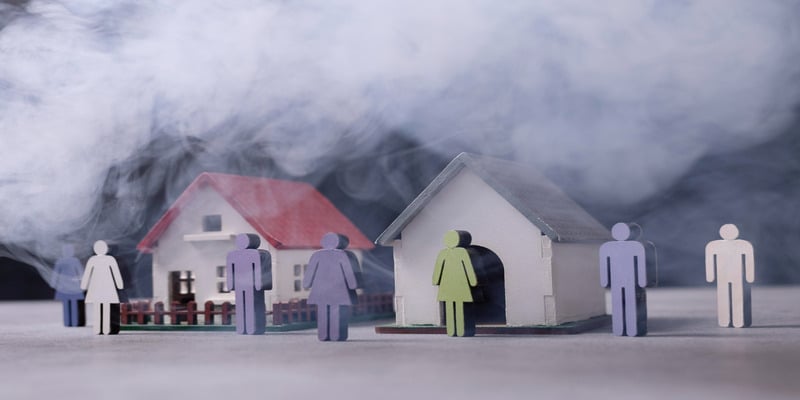Common Symptoms of Bad Air Quality You Should Never Ignore
Key Takeaways
- Critical Warning Signs: Persistent coughing without illness, home-specific headaches, concentration difficulties, and sleep disruption patterns indicate serious air quality problems requiring immediate attention.
- Your Body as Detection System: Your respiratory system, skin reactions, and energy levels serve as biological sensors that detect contamination before expensive testing equipment - throat irritation timing and eye burning reveal specific exposure types.
- Room-by-Room Problem Areas: Bedrooms show morning congestion and night sweats, kitchens need exhaust fan testing, and basements harbor moisture problems that affect entire homes through air circulation patterns.
- Smart Monitoring Solutions: Sensibo Air PRO sensors provide real-time TVOC and CO2 monitoring with automated responses, enabling proactive air quality management through data-driven atmospheric control.
- When to Get Professional Help: Seek expert evaluation when multiple family members experience similar symptoms that improve outdoors, when basic fixes fail, or when severe reactions like breathing difficulties occur.
Walk through your home like a professional inspector, and the symptoms of bad air quality become visible before expensive testing confirms problems. Your teenager's persistent cough. Unexplained fatigue that disappears during weekend outdoor activities. Dust accumulation that defies regular cleaning efforts. Your body functions as an early warning system, detecting atmospheric issues that visual inspections miss. Physical reactions often start months before meters register dangerous levels, making symptom recognition your first line of defense.
Recognizing Health Indicators That Signal Indoor Air Problems
Respiratory System Alerts
Your breathing apparatus works like an atmospheric alarm system. Persistent coughing without illness means you're inhaling irritants exceeding tolerance thresholds. Dry coughs typically indicate particle exposure, while wet coughs suggest mold spores or excessive humidity.
Throat irritation patterns provide diagnostic clues. Waking with scratchiness that improves throughout the day points to overnight bedroom exposure. Consistent throat discomfort signals ongoing irritant presence requiring immediate source identification.
Seasonal allergy sufferers experiencing year-round nasal congestion indoors face elevated allergen concentrations or trapped outdoor pollution infiltrating living spaces.

Neurological and Energy Responses
Poor indoor air quality frequently affects brain function before respiratory symptoms develop. Unexplained tiredness correlating with indoor time suggests oxygen displacement or toxic exposure affecting cellular metabolism. Home-specific headaches indicate volatile chemical accumulation or carbon monoxide infiltration.
Concentration difficulties and mental fog represent serious atmospheric failures requiring expert evaluation. These reactions suggest contamination levels sufficient to impair cognitive function through reduced oxygen availability or neurotoxic exposure.
Sleep disruption patterns often stem from bedroom atmospheric problems. Restlessness, frequent awakening, or morning grogginess despite adequate rest duration indicates nighttime exposure to respiratory irritants.

Skin and Ocular Reactions
Dermatological responses provide valuable data through contact and inhalation pathways. Unexplained rashes on exposed areas suggest airborne chemical irritants or allergen levels beyond physiological tolerance.
Indoor dry skin conditions may indicate heating systems operating without humidity control, creating moisture deficits stressing both respiratory passages and skin barriers.
Eye irritation serves as sensitive volatile chemical detection. Burning, watering, or itching during routine indoor activities suggests formaldehyde presence, cleaning residues, or material off-gassing.
 Location-Specific Detection Methods
Location-Specific Detection Methods
Bedroom Inspection Protocol
Sleeping areas demand focused attention due to extended occupancy with reduced ventilation rates. Poor air quality symptoms in bedrooms manifest as morning congestion, night sweats, and sleep disruption correlating with room occupancy.
Ventilation Assessment: Examine window configurations, HVAC supply/return placements, and door undercuts enabling circulation. Inadequate airflow creates zones where carbon dioxide accumulates while oxygen depletes overnight.
Material Evaluation: Inspect pressed wood furniture, synthetic mattresses, and treated textiles releasing volatile chemicals into breathing zones. New furniture correlating with symptom onset indicates off-gassing requiring remediation.
Kitchen and Utility Zone Analysis
Cooking areas generate multiple atmospheric challenges through emissions, stored chemicals, and appliance operation. Combustion devices need proper venting, adequate air supply, and backdraft prevention.
Exhaust System Testing: Operate fans to verify effective air extraction. Confirm ductwork connections and unobstructed outdoor terminations. Inadequate ventilation allows cooking emissions and combustion byproducts to disperse throughout living spaces.
Chemical Storage Review: Document cleaning supplies, pesticides, and automotive products potentially contribute to atmospheric contamination through container leakage or inadequate ventilation during use.
Lower Level Examination
Basements and crawl spaces frequently harbor problems migrating upward through the stack effect and mechanical distribution. Moisture issues, radon infiltration, and stored chemicals require systematic evaluation.
Moisture control systems, including dehumidification, drainage, and vapor barriers, prevent mold growth and musty odors affecting upper floors. Lower-level atmospheric problems commonly manifest as symptoms of bad air quality throughout entire structures due to natural circulation patterns.
Smart Technology for Atmospheric Management
Sensibo Air PRO controllers feature integrated sensors monitoring Total Volatile Organic Compounds (TVOC) and CO2 equivalent levels, providing real-time contamination feedback. These measurements correlate directly with occupant symptom patterns, enabling proactive atmospheric management.
Automated Response Systems trigger ventilation equipment, purifiers, or HVAC fans when readings exceed programmed thresholds, preventing accumulation leading to health impacts.
Historical Analytics reveal contamination patterns matching family health responses, facilitating targeted remediation and prevention strategies. Long-term monitoring identifies seasonal trends, equipment performance issues, and pollution source contributions.
Multi-Zone Networks provide localized data identifying specific problem areas. Different rooms exhibit distinct contamination signatures based on usage patterns, ventilation rates, and pollution source proximity. Zone-specific control enables targeted responses, activating circulation or purification equipment only where needed.

Professional Intervention Guidelines
- Formal Testing Becomes Necessary when symptom patterns persist despite basic remediation or multiple occupants experience similar health responses. Testing provides quantitative data confirming contamination sources and guiding remediation strategies.
- Immediate Expert Consultation for symptoms including chest pain, breathing difficulties, severe headaches, or neurological effects suggesting significant exposure. These responses indicate potentially hazardous conditions requiring urgent intervention.
- Testing Selection varies by contamination type. Mold assessment encompasses visual inspection, moisture measurement, and spore sampling. Chemical evaluation covers volatile organic compounds, formaldehyde levels, and specific toxin identification based on suspected sources.
- Remediation Implementation eliminates contamination sources rather than treating symptoms. Expert assessment identifies pollution sources, quantifies levels, and develops systematic removal or control strategies. Source control includes material substitution, emission reduction, and isolation, preventing contamination migration.
Prevention Strategies
- Material Selection during construction and renovation prevents many atmospheric problems through low-emission product specification. Flooring, cabinetry, insulation, and paint choices significantly influence long-term indoor atmospheric conditions.
- Maintenance Scheduling for HVAC systems, exhaust fans, and filtration equipment prevents a gradual decline leading to health impacts. Regular filter replacement, ductwork cleaning, and system tune-ups maintain optimal atmospheric conditions.
- Chemical Minimization reduces indoor pollution sources through product substitution and application technique modification. Natural cleaning alternatives, low-emission personal care products, and proper storage significantly improve atmospheric quality.
- Activity Coordination schedules high-emission activities during maximum ventilation periods. Painting, cleaning, and hobby activities generating airborne contaminants should coincide with peak fresh air introduction.
Improving Indoor Air Quality: Cost-Effective Approaches
Ventilation system upgrades often provide the most economical improvement in indoor air quality solutions through increased fresh air introduction, enhanced circulation patterns, and contamination dilution techniques. Mechanical ventilation improvements deliver measurable health benefits while reducing energy consumption through heat recovery systems.
Smart thermostat integration like Sensibo's controllers enables automated atmospheric management based on occupancy patterns, weather conditions, and detected contamination levels. This technology transforms existing HVAC systems into responsive atmospheric control platforms without equipment replacement costs.
Act on Your Body's Warning System
Symptom recognition serves as your home's diagnostic system, alerting you to contamination problems before they escalate into serious health impacts. These physical responses function as biological sensors guiding targeted remediation efforts rather than problems requiring treatment. Smart monitoring systems like Sensibo's integrated sensors transform symptom-based assessment into data-driven atmospheric management, enabling proactive responses to prevent health impacts before they develop. Recognition, expert evaluation, and targeted remediation create indoor environments supporting occupant health rather than compromising it.
FAQ
What are the most common symptoms of bad air quality requiring immediate action?
Persistent coughing without illness, unexplained home-specific headaches, concentration difficulties, and sleep disruption patterns all indicate significant atmospheric issues. Multiple occupants experiencing similar symptoms that improve outdoors necessitate immediate expert assessment.
How can I distinguish poor indoor air quality symptoms from other health issues?
Poor air quality symptoms typically correlate with indoor occupancy periods and improve during outdoor time or extended absences. Seasonal patterns, building activity connections, and multiple occupant experiences help distinguish atmospheric problems from individual health conditions.
What room-specific symptoms warrant professional atmospheric testing?
Bedroom symptoms including morning congestion, night sweats, and sleep disruption suggest overnight contamination exposure. Kitchen symptoms during or after cooking indicate ventilation inadequacy. Basement mustiness or unusual odors suggest moisture problems requiring immediate attention.
How do smart systems help identify atmospheric problems early?
Smart systems like Sensibo's sensors provide continuous monitoring correlating with occupant symptom patterns. Real-time TVOC and CO2 measurements reveal contamination trends before symptoms become severe, enabling proactive remediation.
When should I pursue whole-house versus room-specific solutions?
Whole-house remediation becomes necessary when symptoms of bad air quality affect multiple rooms or central HVAC systems distribute contamination throughout structures. Room-specific solutions work for localized problems like basement moisture or kitchen ventilation inadequacies.
How does improving indoor air quality resolve existing health symptoms?
Improving indoor air quality through source elimination, ventilation enhancement, and contamination control typically reduces symptoms within days to weeks. However, some effects may require longer recovery periods, and pre-existing health conditions may need medical attention beyond atmospheric improvements.



































.jpg?height=200&name=photo_2023-12-08_19-34-41%20(1).jpg)

.jpg?height=200&name=photo_2024-07-25_21-02-41%20(1).jpg)
